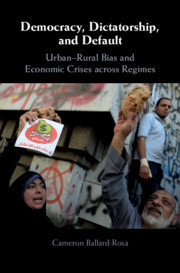Book contents
- Frontmatter
- Contents
- List of Figures
- List of Tables
- Acknowledgements
- 1 Introduction
- 2 Political Survival,Mass Politics, and Sovereign Default
- 3 Regime-Contingent Biases and Sovereign Default, 1960–2009
- 4 Default Pressures in Closed versus Electoral Autocracy: Zambia and Malaysia
- 5 Default Pressures in Consolidated versus Contentious Democracy: Costa Rica and Jamaica
- 6 Urban–Rural Pressures across Regime Types: The Case of Turkey
- 7 Conclusion
- Bibliography
- Index
7 - Conclusion
Published online by Cambridge University Press: 31 July 2020
- Frontmatter
- Contents
- List of Figures
- List of Tables
- Acknowledgements
- 1 Introduction
- 2 Political Survival,Mass Politics, and Sovereign Default
- 3 Regime-Contingent Biases and Sovereign Default, 1960–2009
- 4 Default Pressures in Closed versus Electoral Autocracy: Zambia and Malaysia
- 5 Default Pressures in Consolidated versus Contentious Democracy: Costa Rica and Jamaica
- 6 Urban–Rural Pressures across Regime Types: The Case of Turkey
- 7 Conclusion
- Bibliography
- Index
Summary
In concluding the book, while noting that the political salience of food prices may be lessened in the developed world, I also highlight the applicability of my theory of sovereign default to a wider set of issue areas than just food price policy, including politically-sensitive areas such as oil pricing policy as well as costly "entitlement" programs such as Social Security and Medicare.In addition,
- Type
- Chapter
- Information
- Democracy, Dictatorship, and DefaultUrban-Rural Bias and Economic Crises across Regimes, pp. 171 - 176Publisher: Cambridge University PressPrint publication year: 2020

